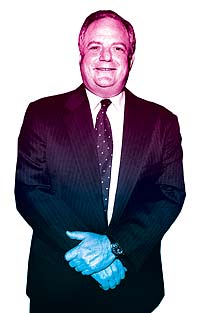
A powerful New York Times theater critic turned op-ed columnist, Frank Rich has taken on everyone from Dick Cheney to Mel Gibson, winning friends and enemies in the process (you know who you are). His new book, The Greatest Story Ever Sold, chronicles the rise and fall of the Bush war-marketing machine.
Didn’t you cover this ground in your columns?
There’s certainly tremendous overlap, but the fact is, when you’re writing a column, you don’t see the larger picture. I really wanted to write a narrative more than an argument. In the run-up to the war in Iraq, a lot of stuff was hiding in plain sight. Some of it I saw at the time, some of it I didn’t. It’s sort of fun, if “fun” can be used in this context, to go back and figure out the rest of the screenplay.
You conclude that the “screenplay” isn’t convincing anymore, that Bush’s credibility is permanently in the toilet. How can you be sure?
I decided to write the book because of Katrina. Maybe it comes out of my sense of theater, but I felt that I needed to have some sort of ending. I basically rolled the dice and felt that I would start writing, because his popularity wasn’t coming back.
Well, it hasn’t so far, but Democrats were optimistic about Kerry, too. What do you think of the midterm elections?
No one knows—it’s a series of separate local elections. But I’m sure Democrats are going to improve their lot, and I do think things are just continuing to fall apart.
But isn’t this problem—politics as advertising—bigger than just one administration?
There’s a cultural problem that transcends party and politics, which is this huge infotainment machinery. I think the disillusionment about this war is so enormous that it may have some lasting impact. That’s what I hope. But maybe not, maybe this is now just built into the modern political-cultural stage.
Slate has said your column is popular because you’re “perfectly tuned to the voice of Manhattan liberalism.” Isn’t this a classic case of preaching to the converted?
That could be said about much of the opinion writing at the Times, which has a liberal editorial page. The fact is, we live in a very, very divided country, and no one wants to listen to the other side. I try to stay outside and just follow my sensibility wherever it takes me, and not according to any kind of checklist. But a lot of people on the right regard the New York Times as a form of Satanism. And there’s just no single writer who can fight that perception. You can, at the very least, shake up the debate. Bill O’Reilly may constantly attack me, but he’s reading me and he feels he has to respond. So it’s fun to mix it up.
Do you miss mixing it up as a theater critic?
No. I had done it for a long time, and I got bored. If you’ve reviewed five Sondheim shows or August Wilson plays, by the time you get to the sixth you have nothing more to say about it except whether this one is a little better or worse than the one that came before.
Do you subscribe to the theater-world idea that no one, including Ben Brantley, has the kind of power as a critic that you did on Broadway?
The myth will never die about the New York Times drama critic, and whenever Ben leaves, they’ll say, whoever his successor is, he can’t close a show or make a hit the way Ben did. I think it’s really overstated. The most fun part for me was calling attention to something that I really loved that was likely to fail commercially anyway.
Friends have said that you’ve mellowed over the years. Does that have anything to do with the shift from theater to politics?
I think it has to do with getting older, having a fantastic marriage and a very fulfilled family life. But that’s got nothing to do with switching from writing about Sweeney Todd to the Iraq war.
—The Greatest Story Ever Sold, By Frank Rich, Penguin Press; September 19 ($25.95). Next: Books From the Left and Right Tackle the Big Questions
